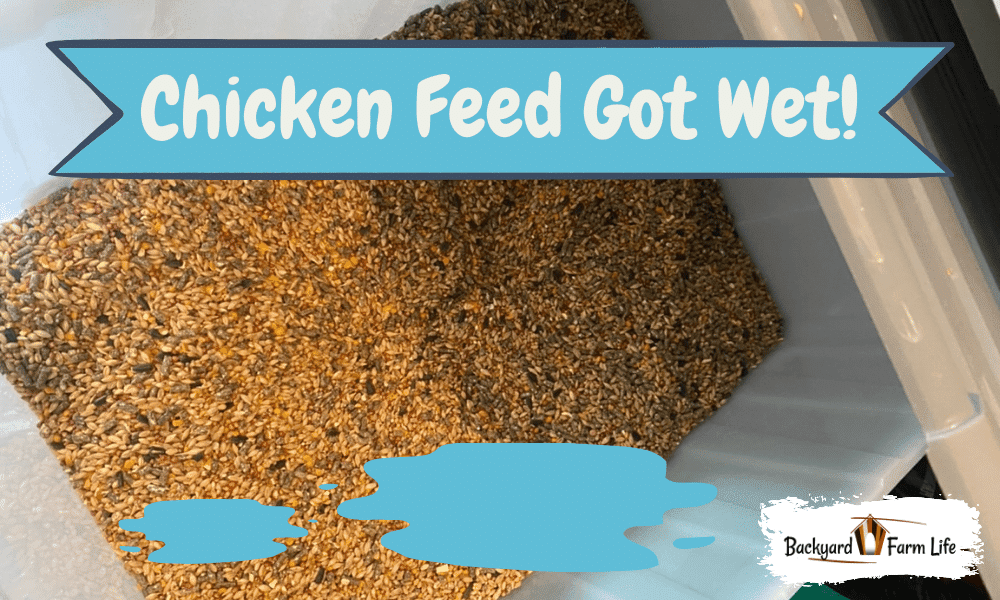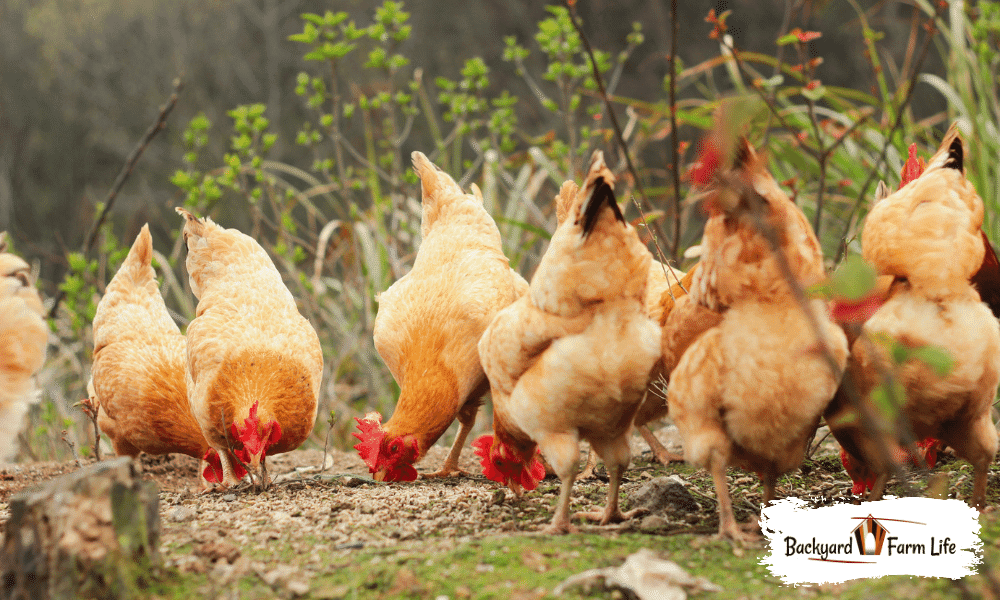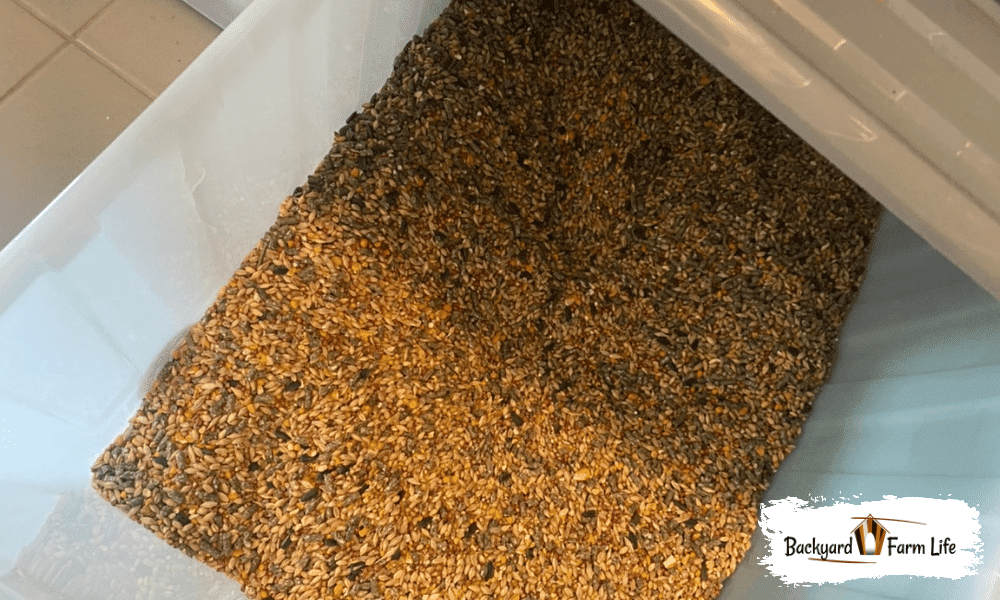As your flock grows, so does the amount of chicken feed you have to supply!
But, no matter how big your reserves of chicken feed get, it’s always critical to keep it stored correctly so it remains dry and fresh!
This is because chicken food that’s wet or has absorbed too much moisture might actually be harmful to your flock!
So if you’ve just found out your chicken food is wet and you’re wondering what you should do, we’ve got you covered.
Here’s what happens when chicken feed get’s wet, whether you can still feed it to your chickens, and what you should do with wet chicken feed!
Contents
What Happens When Chicken Feed Gets Wet

Uh-oh. You left the bag of chicken feed outside in the rain, didn’t you?
Or perhaps excess moisture just made its way into your chicken feed, did it?
Well, whether it’s layer pellets or a layer seed mix, any wet chicken feed can be a major problem.
This is because wet chicken feed is much more likely to spoil, go rancid, or grow mold.
When layer pellets or a chicken seed mix gets wet, it creates an environment where harmful bacteria are able to grow and thrive. This can quickly lead to unhealthy levels of bacteria or toxins in the wet feed.
This is why storing your chicken feed in a dry, secure spot is crucial!
Can You Feed Chickens Wet Chicken Feed?

There’s a difference between chickens eating their food in the rain and chickens eating feed that’s remained damp for weeks.
It can take days to weeks for harmful levels of bacteria to grow on your wet chicken feed. Chickens eating their feed when it’s only just become wet, either from the rain or otherwise, are unlikely to suffer any unwanted side effects.
But, the longer your chicken food remains wet or damp the higher the risk of unhealthy bacteria growth and the less fresh and nutritious your seeds or chicken feed will be too!
All in all, chickens should not consume chicken feed that’s been wet or damp for more than a day or so, and certainly not if it’s been weeks or longer!
The good news is chickens are pretty wise to off-food, which is why some chickens may avoid eating their layer feed if it’s gone off!
What Happens If Chickens Eat Wet Chicken Feed?
The first thing you should be prepared for as a chicken owner is your chickens eating seemingly random or unhealthy things. Get used to it, because chickens will eat just about anything!
Chickens will eat styrofoam, dirt, artificial grass, you name it.
At the end of the day, their digestive systems are rather resilient.
You should never purposefully feed wet chicken feed to your flock. But, so long as it hasn’t been moist and warm for too long, growing excess bacteria, then small amounts shouldn’t do too much harm to your chickens.
However, it’s important to know the risks, and the potentially harmful effects wet chicken feed can have on your chooks. These risks are:
- Chicken feed that remains wet or damp for long periods of time is the perfect breeding environment for fungi and bacteria, both posing potential health threats to you and your chickens.
- Mycotoxicosis is a very common fungal illness that can infect poultry through the wet feed. These mycotoxins are produced by various Aspergillus and Penicillium species that contaminate wet feed. When consumed by chickens, it can make them ill in a few ways.
- In small doses, these toxins can cause weight loss, digestive issues, or diarrhea in poultry.
- If ingested in large doses or if early symptoms are ignored, mycotoxins can lead to kidney and liver failure which are life-threatening conditions to chickens. This is also why chickens should never eat any kinds of moldy food, whether it’s seeds or scraps.
What To Do If Your Chicken Feed Gets Wet

Alright, so you’ve just noticed the food you’re feeding your chickens is damp or wet.
First, you should do a simple test to see how damp your feed really is. After carefully sifting through the lot, try to find any wetness or obvious moisture.
If you identify your chicken feed is indeed wet, then it’s imperative that you separate all the dry seed or pellets and dispose of the rest.
Ensure the “dry” chicken feed is 100% dry and there is no evidence of spoiling or any dampness.
It’s not worth trying to salvage wet or overly damp chicken feed as it’s possible the damage is already done, harmful bacteria has grown already, or the feed has already spoiled.
Try to identify what went wrong and how your chicken feed actually became wet to prevent it from happening again!
What Causes Chicken Feed To Get Wet?
Aside from accidentally pouring water over your chicken feed, there are a few natural ways it can actually absorb excess moisture and become damp or wet.
Firstly, you’d be surprised at how quickly moisture in the air can infuse into dry seeds or chicken feed. This is why it’s crucial to store your feed in an airtight package or container.
The climate and humidity in the air can also play a major part in the absorption of excess moisture in the air too.
It’s important to take action and store your chicken feed in the most secure and most driest of places that are available to you, ideally off the ground and out of direct sunlight.
That’s All!
Chickens will pretty much eat whatever we offer them. That’s why it’s so important to only offer foods to your chickens that are absolutely safe and healthy to eat.
When it comes to wet chicken feed, it’s only OK for your chickens to eat if it’s only recently absorbed water or moisture.
Just to be clear, chicken feed that has been wet or damp for days or longer is not safe to feed your flock. The longer your chicken feed sits in damp or moist conditions, the higher the risk of unhealthy bacterial growth.
This can have some detrimental effects on chickens, which is why you should never feed your chickens wet chicken feed — and you should take precautions to store your chicken feed carefully.

A lot of pellets have dropped to the ground. now they are wet and mushy. can I scoop up mush, and bake it in the oven to remove water and make like cupcakes or squares for the flock? I don’t see what would be wrong with that, because the heat would kill any bacteria, and they would probably eat it. I would like to try it, in a small portion, and see what happens.